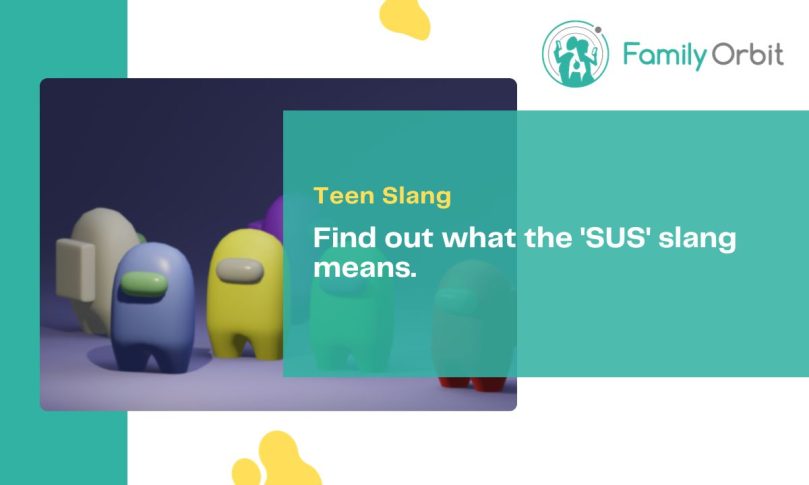Slang and chat language are constantly evolving. This type of mainstream communication language welcomes new words and phrases almost every day.
“SUS” is one of these many chat acronyms that teens use every day in their chats. You must have spotted this slang on your kids’ mobiles or their social platforms. But do you know its meaning or where did it come from? Read on to find out more!
Unveiling the Enigma: SUS Slang’s Growing Presence
If your kids were playing the fad game “Among Us”, they were definitely introduced to the slang “SUS”. This acronym stands for “suspicious”. However, in the game, it was meant to refer to a “suspect”.
However, the acronym managed to find a place in the slang dictionary away from the game. It generally means something that is shady, off, or weird. Despite the shrinking popularity of the game, this acronym has maintained its versatility.
Cracking the Code: The True Definition of ‘SUS’
The chat acronym “sus” is employed in various ways, but always indicates something sketchy. It can function as a noun, verb, or adjective depending on the sentence structure. Whether written in capital or small letters, “SUS” has the same meaning.
In early 2020, the widespread of the online game “Among Us”, made players familiar with the acronym sus. The game’s plot revolves around detecting the imposters pretending to be a part of the main spaceship crew.
However, the real turning point in the popularity of this slang occurred when it was frequently featured in memes. Also, multiple TIkTokers have posted videos of the gameplay or videos of them using the word in their daily conversations.
Where Teens Play Detective: Typical Scenarios for ‘SUS’

SUS, which is a short form of suspect, or suspicious, and can expressively refer to people or things. The slang is so successful that you can hear or see it outside online games and platforms. Teens often use “SUS” to refer to a shady post, tweet, or comment.
Also, it can be an alternative informal word for spam mail or unpleasant-smelling food. Furthermore, the word can describe a person who isn’t genuine or acting deceitfully.
Let’s have a look at some examples of how sus can be used in a sentence:
- “Her excuse for being absent every time we have a team meeting is getting really sus.”
- “That new guy at work gives me a sus vibe; I can’t quite put my finger on it.”
- “When he started acting all sus during our conversation, I knew something was up.”
- “Why are you being so sus about your plans for the weekend? Just tell me what’s going on.”
- “I find it sus that they suddenly unfollowed each other on social media.”
- “She kept looking over her shoulder while texting, and it seemed sus.”
SUS in Context: The Fine Line Between Trust and Suspicion
SUS comes in various contexts in both online and offline conversations. It is commonly employed when a sender accuses a person of being sketchy. For instance, your teen may comment on a post with “That’s sus”.
This indicates that your kid suspects the authenticity of the post. Also, “sus” is found in various online memes and is commonly used as a joke or a teaser between friends. In the gaming world, sus is used to identify an imposter or a player who uses shady hacks in a game.
Why ‘SUS’ Is Trending: Insights into Its Teen Appeal
Slang like “SUS “, “SOS” or “OG” appeal to teens as they are short, easy to write, and expressive. “Sus” in particular is straightforward in expressing skepticism or doubt about the behaviors or actions of a person.
Also, it is a popular way of mockery or joking. It is found on various mems and online vernacular across platforms including TikTok, Instagram, and Snapchat. Furthermore, the adaptability of “sus” makes it extra popular.
One of the best things about using sus in chats is that it is easy to understand when included in the proper context. So, you do not have to be slang-savvy to correctly use it in conversations with your teens.
Parental Perspective: Grasping the Nuances of ‘SUS’ Slang
In the ever-evolving world of chat slang, understanding the uses and contexts of “sus” is essential. This is useful in understanding the modern language that teens currently speak.
At first, you might feel a bit confused about finding the right context. However, with constant exposure to online conversations, you will gradually grasp its nuance and correct usage.
A successful approach to grasping the meaning of “sus” is trying the games that popularized this acronym. It helps in understanding the original context of the word.
Connecting with Your Teen: Engaging in Open Slang Conversations

Most trending words are safe to use. However, it is important to keep an eye on their slang to be 100% certain of their online safety. Keep in mind that these words can have a dark side. It’s best to have open conversations with your teens about the words they are using.
When it comes to communicating with your teens, it is important to avoid using a confrontational or judgmental tone. Try to show empathy, interest, and respect for this modern way of communication. Leading a conversation that is based on curiosity and understanding of the cultural significance of slang will eventually pay off in bridging the generation gap.
The continuous evolution of teen slang is associated with the spread of social media platforms and chat apps. Such versatility ensures its prevalence in the future. Therefore, it is essential to educate and familiarize yourself with this ever-evolving language to avoid any sort of misunderstandings.
Using a versatile parental control app is also useful in increasing the online safety of your teens and enjoying an extra piece of mind.
These apps will keep you notified about the messages your kids receive. Furthermore, it will help you block any harmful or abusive content that is not safe for your teens. They can be a great way to keep your kids safe and ensure they aren’t speaking to the wrong people.
- Monitor Calls & Text Messages
- View Photos and Videos
- Location Tracking & Geofence
- Monitor WhatsApp & Kik
- Detect & Alert for Inappropriate Activities
- Monitor Websites Visited
- Compatible with Android and iOS
- What Does TBH Mean: Decoding Teen Communication
- GOAT Meaning: The Jaw-Dropping Teen Slang Parents Can’t Ignore!
- What Makes an Emo Kid: Understanding the Emo Culture Among Teens
- 200+ Teen Slang Terms Decoded for Parents: Unlocking the Teen Lexicon
- SUS Meaning: The Stealthy Teen Slang That’s Keeping Parents Guessing!
- What Does OC Mean: A Teen Slang Demystified
- 143 Meaning: Decoding the Numeric Expression of Love

